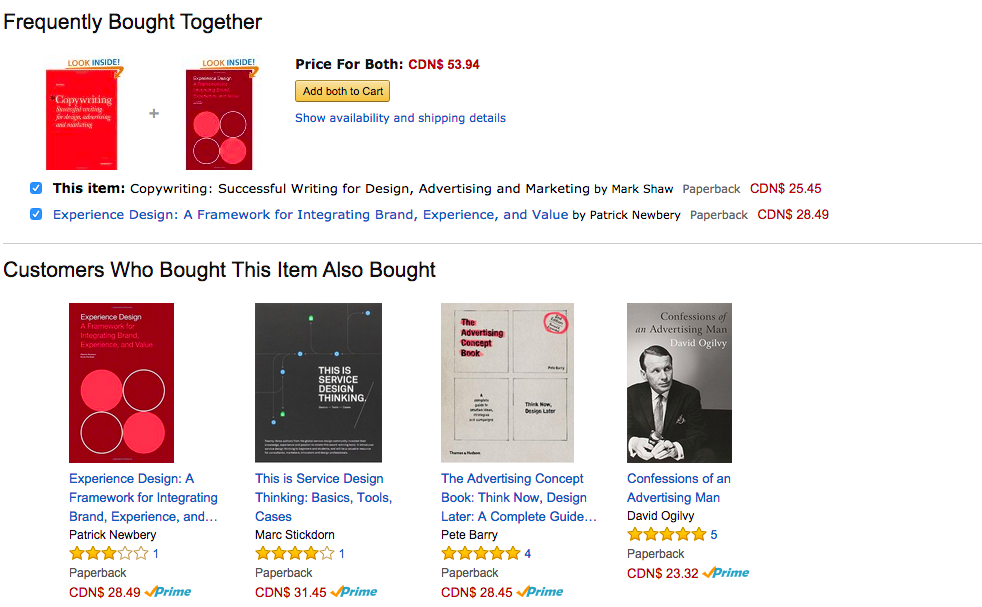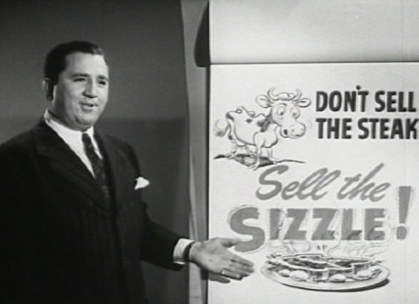
If you’re anything like me, you may be suspicious when someone tries to upsell or cross-sell you on something. Nobody wants to spend more money than they have to. As soon as I get a whiff that it’s about to happen, I can feel the cold steel door of my usually open mind start to slam shut. I mentally prepare for all the ways I can say no before I even hear the pitch.
But I realized that those are only the situations where the seller has done a bad job upselling me. Situations where I felt like they didn’t really understand me, my needs or interests, and were just trying to milk more money out of me. (Think extended warranties. Ugh.)
The reality is I have been successfully upsold and cross-sold in many situations but I don’t even think about it because they were positive experiences. I ended up with more value than my original request, whether through a better product, an improved service, or a discount.
For example, I had a mascara that I loved. (For the uninitiated, mascara is a type of makeup used on eyelashes). It’s not cheap but after searching lots of brands and wasting lots of money on ones I didn’t like or that were of poor quality, I finally found what I thought was my one true eyelash-enhancing love.
I went to buy a replacement tube one day but before I paid, the sales clerk asked me if I might be interested in the special offer gift box of sampler mascara instead. I prepared myself to say no right off the bat but then I listened more closely to what she was saying.
For what was roughly the same price as my mascara, I could get a box of six trial-size mascaras all from leading brands (including my favourite) with the major bonus being a coupon for a free full-size tube of any of those brands.
So I could try out new brands at really no risk or extra expense, it was about a 6 month supply of mascara, and I could still get a full-size tube of my choice at the end. All for about $4 more than what I was going to pay for my original single purchase.
I decided to go for it and I loved it. In trying all the different brands I discovered some new favourites along with a few I just flat out didn’t like. In the end, I used my coupon for a full-size tube of mascara that was a totally different brand from my original. And now I have a new favourite.
I don’t view that experience as an upsell but it totally was, and one I got a lot of value out of.
Plus, the experience was so positive that I now trust that particular sales clerk so when I go to that store, I seek her out for recommendations because I feel like she has my interests in mind. I also shop there more often than I did before.
If done right, upselling and cross-selling your services can strengthen your relationship with clients, establish your credibility as a valued partner, and improve your profits.

What’s the difference between upselling and cross-selling?
These terms can get confused so let’s make the distinction as clear as possible:
Upsell
The upsell is really about getting your client to spend more money, to buy a higher-end version of whatever it is they originally had in mind.
Example: Your agency is creating a campaign for a client. The original budget called for using stock images but you convince them that by spending more money, your designer could make custom illustrations that would establish a distinct look and feel that the client’s brand would own, they could reuse these images in future campaigns, and it would really help create a memorable impression on their target audience. It may cost a bit more but it has the potential to return greater value.
Cross-sell
Cross-selling is convincing your client to spend more money on other services that are different but complementary to their original need.
Example: A client comes to you looking for a website rebuild. You convince them to first have your agency do an audit of their existing site and then create a strategy based on the findings. This delivers value to the client by providing an informed plan of attack for creating a more effective, goal-oriented website.
Why you need to upsell and cross-sell
While there are a number of benefits to upselling and cross-selling, here are the most compelling:

Why is it easier to sell to an existing client? Because they already know you, they trust you to do good work, and they like working with you. It’s easier for them to say yes. If you do it right, you can upsell and cross-sell to existing customers without appearing like you’re just trying to get them to spend more money.
While it’s usually the responsibility of the agency owner and/or a biz dev person to bring in new leads, account directors, and other members of your team can get involved by upselling and cross-selling your services to your existing clients. Now you have more people working on more opportunities for more revenue. Go, team.
If you’re looking to increase your profits AND cement your client relationships, then upselling and cross-selling are the best ways to do that.
The trick is to make sure you do it right. No one wants to feel like they’re dealing with the stereotypical slimy salesperson. And you really don’t want your agency associated with that kind of reputation.
So here are some suggestions for the best ways to successfully upsell and cross-sell.
Know your clients
In order to successfully sell additional services to your clients, you need to demonstrate meaningful value. And the only way you can do that is to understand their needs, their goals, and their challenges. Research as much as you can about their industry, their customers, their business, their process.
A big part of knowing your customers also involves listening to them, really listening. Learning as much as you can about your clients can help you recognize and create opportunities for upselling and cross-selling.
Do your customers know you?
When I was freelancing, most clients knew me as a copywriter and that was the bulk of the jobs I got hired for. But I also have a lot of experience in brand development. It’s one of my strengths, and I really enjoy that type of project.
But one day a small agency I had been working with for some time invited me to a meeting to talk about a potential project.
They explained the project involved branding and then introduced a new person to the team. The agency owner said, “We really felt we didn’t have the resources here to handle the brand development part of the project so we brought her in to work with the team.”
I could have been insulted. Did they think I couldn’t do the job to their standard? But I quickly realized that they had no idea branding was part of my skill set. They only knew me as a copywriter.
Sure, they liked me and they liked my work, but they liked it all in the context of a copywriter. I had never once talked about other services I could offer them.
This was a HUGE missed cross-selling opportunity for me since I was already there on a regular basis, we had a great relationship, I worked well with their team, they knew the quality of my work, and I had contributed to some very successful projects. They would be happy to hire me if it meant more work for them.
While I couldn’t really change how this particular project was going to play out, I made sure that I met with the agency owner, the director of client services, and the creative director as soon as possible. I filled them in on the other ways I could help them, bringing value to the agency and their clients beyond just copywriting.
And sure enough, when the next branding project came up, they hired me.
Takeaway
Don’t assume your clients know all your services or products. Part of your onboarding process should include an overview of all your services.
Communicating regularly with your clients through blog posts and email campaigns will help ensure you don’t miss an opportunity for a lucrative cross-sell.
Focus on Value
Demonstrating the value of the upsell or cross-sell will shift the mindset of your client from one of “I DO NOT WANT TO SPEND MORE MONEY!”, to “We NEED this to be successful.”
It’s important to define the value clearly to the client, don’t just leave it up to them to figure out. Explain how it will help them achieve their goals, solve their problem, or improve their business.
As ye olde saying goes, “Don’t sell the steak, sell the sizzle.” So don’t get caught up going over all the cool features of your services; show the client how they will benefit from those features.

If you can show that what you’re suggesting is going to improve the situation for the client, and then follow through, you’ll be an all-star hero. They’ll regard your agency as a true partner in their success.
That kind of client is going to keep coming back for more, they’ll be more open to future suggestions, and they’ll refer you positively to other businesses.
It’s a marching band/fireworks celebration for everyone!
When not to upsell or cross-sell
Like many things in life, timing is everything and the same holds true when it comes to upselling or cross-selling to your clients.
Be sensitive to the current context of your client and their business. Again, listen to what they’re saying and what they’re asking for to make sure your solution is applicable.
If a client is unhappy about something or your agency hasn’t delivered on other items, this is not the time to upsell. You need to deal with the immediate needs of your client to get things back on track before introducing anything else to the mix.
And don’t try to upsell and cross-sell on every project you have with a particular client. They will start to get suspicious and lose trust that you sincerely care about the success of their business over the bottom line of your business.
I’ve taken my car to my mechanic a few times thinking something was wrong with it (you know, THAT noise?) On more than one occasion he has sent the car home to me, saying he couldn't find anything wrong. No charge.
I was stunned. Wasn’t it the law of all mechanics to always find something wrong with your car, something that needed more work, something that was going to cost me more money?
Now when my mechanic actually does tell me I need some particular work done on the car, I believe him. I trust him because I know he doesn’t just try to shake me down me unnecessarily every time. He only says it when he means it.
Conclusion
Upselling and cross-selling will improve your business, but you should have an agency-wide plan for putting it into practice. Your team needs to be up-to-date on your all services and should be briefed on the best practices for approaching clients. The why, how, and when of upselling and cross-selling so it’s done strategically, not haphazardly.
So, in the process of that, you’ll probably be writing more proposals. Might I suggest a fantastic online solution that makes it easier to create beautiful, winning proposals and get faster client sign-off? Get Proposify Free.



